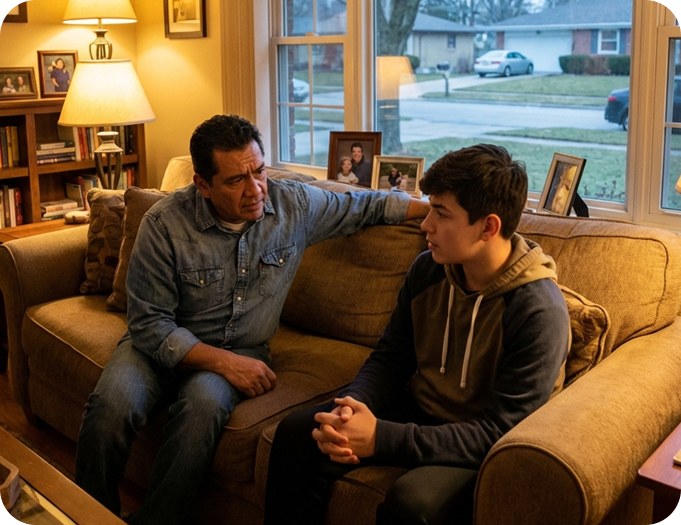I'm David Martinez, a software engineer in Austin, Texas. My son Tyler just turned 16 and plays wide receiver on his high school football team. I've been using FamiSafe since he was 14, and it's helped us build healthy phone habits. But last October, something changed. Tyler started acting different—his bedroom door stayed shut longer, and every time his phone buzzed after 9 PM, he'd flip it over or hide the screen. I knew something was off. That's when FamiSafe showed me what was really happening in those late-night hours.
Meet the Martinez Family Story
From Late-Night Texts to Life Lessons: A Father's Guide to Digital Boundaries

Our Family's Struggle

Challenge
Tyler's high school has a strict no-phone policy, so his phone sits in his locker all day. That meant every evening, he was glued to it—texting nonstop from 7 to 11 PM. At first, I thought it was just typical teenage stuff. But one night, I checked FamiSafe's message monitoring during the non-school hours, and my heart sank. Tyler was exchanging sexually suggestive texts with several girls from school. Some messages even asked for intimate photos. I felt sick. This wasn't just inappropriate—it was dangerous, potentially illegal, and completely disrespectful. When I dug deeper, I realized he wasn't acting alone. His football teammates were doing the same thing, and Tyler thought this was how you fit in, how you proved you were cool. He didn't see the harm. He didn't understand the legal consequences or how it hurt those girls. I was torn between anger and heartbreak.

Solution
I didn't storm into his room that night. Instead, I waited until Saturday morning when we were both calm. I sat him down in the living room, phone off, just the two of us. "Tyler, we need to talk," I said. I showed him what I'd seen—not to shame him, but to help him understand. We talked about consent, about respect, about how a single screenshot could ruin someone's life—or his own. I told him about peer pressure, about how real men don't follow the crowd when the crowd is wrong. Tyler got quiet. Then he opened up. He admitted he felt pressured, that he didn't want to be the "lame" one. We made a new agreement together: phone goes on the living room charger at 10 PM every night. He keeps his bedroom privacy, but he has to own his actions. Over the next few weeks, FamiSafe showed me the change—fewer late-night texts, healthier conversations. Tyler even came to me one night and said, "Dad, you were right. I feel better now."
The Martinez Family Today







